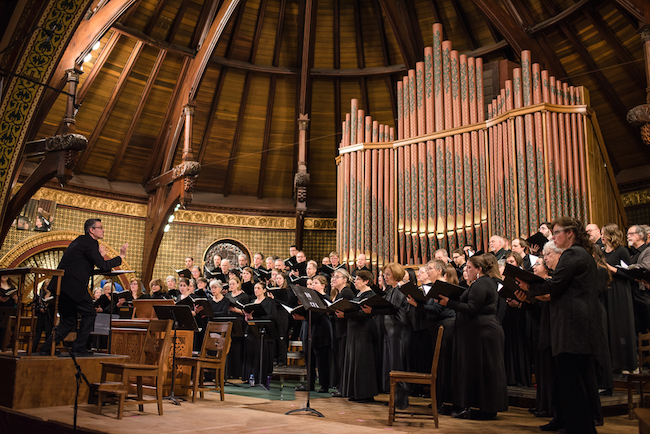Concert Review: Chorus pro Musica’s “Together”
Throughout the night, CpM music director Jamie Kirsch kept tempos lively and never lost sight of the overarching shape of each of the evening’s big pieces.

Chorus pro Musica in action at Newton’s First Baptist Church. Photo: Axie Breen.
By Jonathan Blumhofer
Just about the only thing better than a smartly-curated program is a concert performance of it that’s equally well-executed. Chorus pro Musica’s (CpM) Together, a survey of the theme of unity in music that danced from the obvious (vocal duets) to the mystical (prayers for universal brotherhood), managed both on Saturday night at Newton’s First Baptist Church.
The night began with Arvo Pärt’s austere L’Abbé Agathon, a 2004 setting of texts by third-century Egyptian monks. In it, the eponymous abbot comes across a leper and the two spend a day together, in which the latter makes various requests of the prior (to be carried to market and back, be bought certain goods, etc.). At the end, the leper blesses Agathon for his generosity and vanishes: only then does the abbot realize that he had been tested by an angel.
Pärt’s setting – for women’s voices, soprano and alto soloists, and strings – is spare and meditative. Only near the end, when the leper pronounces his benediction, does it brighten, with bustling, lustrous, ascending triads. It ends in an enigmatic haze.
Saturday’s performance was strongly sung. The ladies of CpM gave a cool, clean account of the story’s action, while Agathon’s soloists – alto Maggie Rodriguez singing the title role and soprano Sherezade Panthaki taking the part of the leper/angel – were finely matched in tone, intonation, and vocal intensity. The string orchestra, too, made particularly fine work of the score’s several passages of extended techniques.
After the Pärt, Panthaki was joined by countertenor Reginald Mobley in a pair of Handel duets, “To thee, thou glorious son of worth” (from Theodora) and “Welcome as the dawn of day” (from Solomon). Some balance issues in the opening Theodora excerpt notwithstanding, they sang beautifully, Panthaki’s light, clarion voice fluently weaving through and around Mobley’s cordial, ringing instrument.
Bach’s cantata BWV 140 (“Wachet auf, ruft uns die Stimme”) followed. CpM’s was a particularly hearty and propulsive account of this well-known score. The opening chorale was vigorously sung, the various “…auf” interjections (“wach auf,” “Wohlauf,” “steht auf”) given robust – but never shrill or forced – accents. The melismas on “alleluia” were also finely done: rhythmically and tonally accurate, and texturally lucid.
The cantata’s two duets, settings of love poetry from the Song of Songs, were sung by Panthaki and baritone David McFerrin with fervency and, in the last, a touch of playfulness. Tenor Jonas Budris shone in his short recitative, singing resonantly and with excellent diction.
After the Bach came the pairing of Judith Bingham’s The Darkness is No Darkness and Samuel Sebastian Wesley’s Thou Wilt Keep Him in Perfect Peace. The Bingham is a 1993 fantasy on the Wesley and meant to be sung as an introduction to it: she extracted many of the older composer’s more esoteric gestures in Thou Wilt Keep Him and repurposed them in her own adaptation of Psalms 119 and 139.
It’s an interesting piece in its own right, juxtaposing various contrasts of texture and harmony, though it was hard to hear it as anything more than a prelude to the Wesley, which is a radiant exemplar of the 19th-century English choral tradition.
CpM sang both works warmly, though the latter, with its rich chromatic turns, left the stronger impression.
Wrapping things up was Leonard Bernstein’s Chichester Psalms. Written in 1965, this isn’t his most ambitious score or path-breaking, but, for quality of materials and craftsmanship, it’s perhaps his most satisfying concert piece.
It sure seemed that way on Saturday, given the rhythmically incisive performance CpM delivered of its lilting first movement. The second brought back countertenor Mobley for a delicate, tangy account of Bernstein’s bluesy setting of Psalm 23. The choir’s violent interjections (“Why do the nations rage?”) in that movement were balanced by the devotional affection with which they imbued the closing prayer of the finale (“How good and how pleasant it is for brethren to dwell together in unity”).
Throughout the night, CpM music director Jamie Kirsch kept tempos lively and never lost sight of the overarching shape of each of the evening’s big pieces. He was joined by a capable array of instrumentalists – a string orchestra in the Pärt; a Baroque ensemble for Handel and Bach; organist Ian Watson in the Bingham; and Watson, harpist Krysten Keches, and percussionist Bob Schulz in the Bernstein – who played responsively and, often enough, with lots of color.
Jonathan Blumhofer is a composer and violist who has been active in the greater Boston area since 2004. His music has received numerous awards and been performed by various ensembles, including the American Composers Orchestra, Kiev Philharmonic, Camerata Chicago, Xanthos Ensemble, and Juventas New Music Group. Since receiving his doctorate from Boston University in 2010, Jon has taught at Clark University, Worcester Polytechnic Institute, and online for the University of Phoenix, in addition to writing music criticism for the Worcester Telegram & Gazette.
